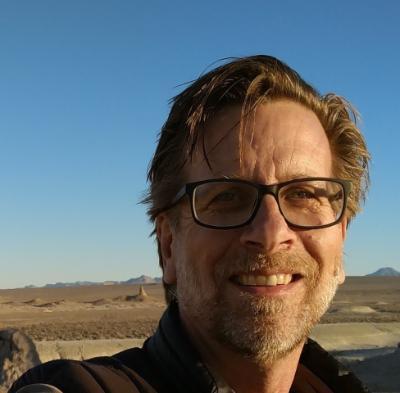In Search of A Way: Walking the Spiritual Path
“Where are we going? Always home.” (Novalis)
Course Description
Walking a path. Following a way. The journey. The impulse to walk is so strong within us. Perhaps because of this, it has proven a durable and useful metaphor for spiritual longing. At the very heart of Christian spirituality stands the image of a path: the hodos or “way”; a key to understanding both the identity of Christ (“I am the Way”) as well as the life of faith (“the Way, the truth the life”) and the meaning of community (Christians were often known simply as “people of the Way”). Walking or journeying would remain critical to the Christian spiritual imagination for centuries afterward. Not only among those who took up pilgrimages, to Jerusalem or Santiago de Compostela or Canterbury. But also for those who envisioned the encounter with God--in prayer and in community living--as a kind of path or journey: the early monks’ journey into the desert; the long, difficult passage through the darkness envisioned by Gregory of Nyssa in his Life of Moses; Bonaventure’s elaborate and subtle Itinerarium: The Mind’s Journey into God; John of the Cross’s intense path of purgation outlined in his Ascent of Mount Carmel; Teresa of Avila’s long descent into union with God evoked so beautifully in her Interior Castle. There is a recurring sense here that walking, of following a path, traveling along a route both familiar and strange, is somehow essential to our capacity to grasp the meaning of our own spiritual experience, to help us know who we are (in God). Itineraries found in Christian mystical traditions have a particular importance to play in illuminating what it means to be “in search of a way.” Members of the class will be invited to engage and critically respond to these traditions and to consider how learning to “walking the path” can draw us closer to God and one another in love.
Program Goals
By the end of the program students will have:
- A deeper understanding of the varied Christian mystical traditions and their practices
- A stronger understanding of prayer, various prayer practices and their own spiritual discipline
- A fuller sense of contemplative practices and how a disposition to such practices may be assimilated into daily life.
- An awareness of how the wisdom of the Christian mystical tradition can be adapted to the needs and realities of today’s world as well as their possible application to the students’ own lives.
- An awareness of what it means to “walk the path”—both within and without—and of what it means to bring a deeper understanding to this practice.
-
Begins: October 12, 2024
Enroll: Registration is open online here or call 310-338-2799
Course: CSXX 910.01
Tuition: $710
EARLY REGISTRATION DISCOUNT
Register by 10/3/2024 and receive a $70 Early Registration Discount.
-
Class meets online, via Zoom
From 9:00am -12:30pm
October 12: Introduction: Setting Out Along the Way
November 9: Into the Desert (Athanasius, Life of Antony)
December 7: The Way of Darkness & Unknowing (Gregory of Nyssa, Dionysius the Areopagite and the Cloud of Unknowing).
January 11: Journey into the Self (Augustine’s Confessions)
February 8: The Way of Perfect Joy (Francis of Assisi)
March 8: Living Without a Why (Meister Eckhart, Hadewijch of Antwerp and Marguerite Porete).
April 12: The Hazelnut (Julian of Norwich’s Showings).
May 10: The Diamond Within: (Teresa of Avila’s Interior Castle)
June 7: Final Class (Shared Presentation of Final Papers)
-
Successful completion with a grade of 'B-' or better
Regular Attendance at our monthly gatherings (not missing more than one class per semester). Unless otherwise noted, our meetings will take place on-line through Zoom
Complete all readings, exercises and written reflections (due in December and May). In December, students will write a 3-4 page double spaced reflection essay on the work completed during the first four months of the course. In May, students will write a 5-7 page double spaced integrative paper. Students will also be asked to do a presentation in small groups.
-
Students are encouraged to attend all classes, due to the intensive nature of the course work and the topics covered. One absence per term is allowed; students even when absent are responsible for all course requirements.
-
Douglas E. Christie

Media
Publications
Douglas E. Christie on Depth Without Resolution
Healed and Whole Forever, 2021
The Joy of Feeling Close to God
Wasting Time Conscientiously By Douglas E. Christie, ONEING: Unveiled
What is Contemplation?: An Interview with Douglas Christie
Biography
Douglas E. Christie, Ph.D. is Professor Emeritus of Theological Studies at Loyola Marymount University in Los Angeles. He is the author of The Word in The Desert: Scripture and the Quest for Holiness in Early Christian Monasticism (Oxford), The Blue Sapphire of the Mind: Note for a Contemplative Ecology (Oxford), and The Insurmountable Darkness of Love: Mysticism, Loss and the Common Life (Oxford). He has offered retreats to Benedictines in Oregon, and Cistercians in California, Oregon and Belgium among other places. He has been awarded fellowships from the Luce Foundation, the Lilly Foundation and the National Endowment for the Humanities. From 2013-2015 he served as Co-director of the Casa de la Mateada study abroad program in Córdoba, Argentina, a faith-based program rooted in the Jesuit vision of education for solidarity. He lives with his family in Los Angeles.
